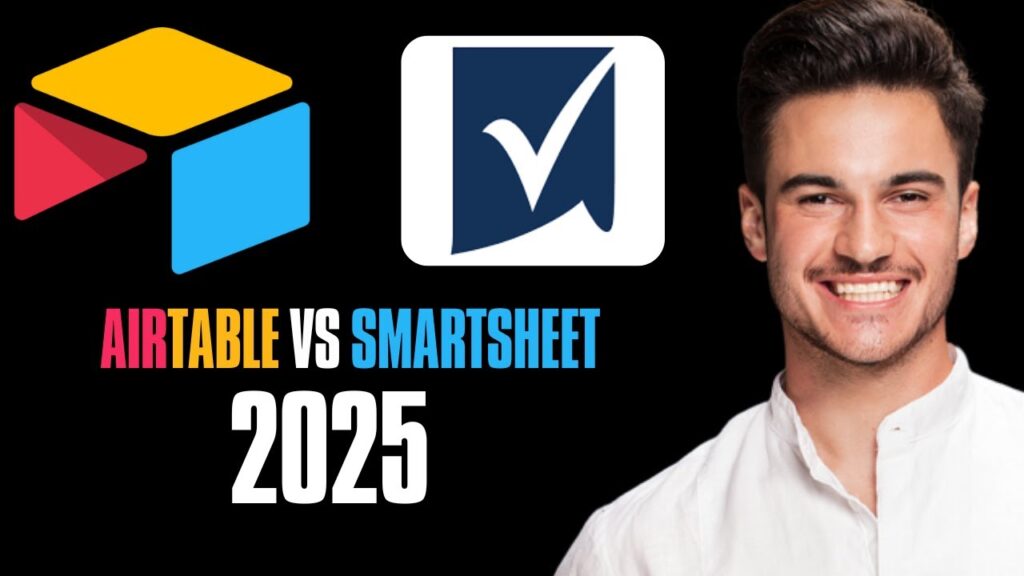Airtable vs Smartsheet: A Comprehensive Comparison for Project Management
If you’re managing projects, tracking data, or collaborating with a team, you’ve likely come across Airtable and Smartsheet, two powerful tools that extend far beyond traditional spreadsheets. But which one is right for you? In this article, we’ll compare Airtable and Smartsheet in terms of features, pricing, ease of use, integrations, and more. By the end, you will understand which tool suits your workflow best.
What Are Airtable and Smartsheet?
Airtable is a spreadsheet-database hybrid that offers database-like functionalities while maintaining a familiar spreadsheet interface. It excels in collaboration, project management, and visually organizing data.
Smartsheet, on the other hand, is a work management and automation tool tailored for teams that require structured project management, Gantt charts, and enterprise-level collaboration. Both tools enhance the traditional spreadsheet experience but serve different user needs.
Ease of Use
No one wants to waste time figuring out complex software, so ease of use is crucial.
Airtable is designed with simplicity in mind, featuring a sleek, modern interface that resembles a mix between Excel and a database. Users can easily create tables using drag-and-drop functionality and utilize templates for project tracking, inventory, or CRM. It supports various views, including grid, Kanban, calendar, and gallery, making it perfect for non-technical users and creative teams who prefer a visual approach.
Smartsheet offers a more structured experience, with a familiar Excel-like interface comprised of columns and rows. It includes built-in project management tools such as Gantt charts, dependencies, and resource tracking, making it suitable for teams with complex workflows.
Verdict: If you prioritize simplicity and flexibility, go with Airtable. If you need structured project management, Smartsheet is the better option.
Features
Both platforms offer unique features that cater to their respective audiences.
Airtable provides high customization, allowing users to create custom fields, link records across tables, and establish database relationships. Its built-in automation tools enable users to set triggers and workflows without coding.
Smartsheet focuses on project management and structured workflows, providing advanced tools for task dependencies, resource tracking, and automated approvals—ideal for teams managing complex projects with multiple stakeholders.
Verdict: If flexibility and database-like customization are your priorities, choose Airtable. If you require a robust project management tool with structured workflow automation, Smartsheet is the stronger choice.
Collaboration and Integration
Collaboration and integration features are essential for any team using these platforms.
Both Airtable and Smartsheet offer real-time editing, commenting, and sharing capabilities. However, their approaches vary:
Airtable facilitates quick collaboration, allowing multiple users to work on the database simultaneously. It supports role-based permissions, ensuring team members can only access and edit relevant sections.
Smartsheet is tailored for enterprise-level collaboration, providing team dashboards, detailed permission controls, and workflow automation. It’s particularly beneficial for organizations managing large-scale projects across multiple departments.
In terms of integrations, both platforms connect with popular applications like Google Drive, Slack, Zapier, and Microsoft Teams. However, Smartsheet offers deeper integrations with enterprise-level software like Salesforce and Microsoft Outlook, making it a preferred choice for larger businesses.
Verdict: If you need simple and effective collaboration, Airtable is ideal. If your organization requires advanced collaboration with enterprise-level integrations, Smartsheet is the better option.
Pricing
Budget considerations are crucial when selecting the right tool.
Airtable offers a free plan with basic features, making it a great fit for individuals and small teams. Its Plus plan is priced at $20 per month and adds more storage and customization options. The Pro Plan, at $45 per month, includes advanced automation and integrations. For larger organizations, Airtable provides an Enterprise plan with custom pricing.
Smartsheet also has a free plan but with more restrictions. Its Pro Plan is $9 per user per month, including basic automation and reporting features. The Business Plan, at $19 per user per month, unlocks full project management tools. Smartsheet also offers a custom price plan for enterprise-level security and compliance features.
Verdict: Airtable’s free plan is more generous for small teams, while Smartsheet’s pricing offers better value for structured project management.
Performance
How do these tools perform with larger databases?
Airtable is fast and responsive for smaller databases, but it can slow down as the number of records increases due to its database-like structure. This may become an issue when dealing with thousands of records and complex relationships.
Smartsheet is optimized for enterprise use, providing more efficient handling of large projects and expansive databases. It performs better for teams managing multiple tasks and dependencies.
Verdict: For smaller, visually dynamic projects, Airtable performs well. However, for large-scale enterprise projects, Smartsheet has the upper hand in speed.
Security and Compliance
Security is a crucial aspect of database management.
Airtable offers basic security features, including password protection, two-factor authentication, and role-based permissions. While sufficient for general use, it may not meet the needs of organizations requiring enterprise-grade compliance.
Smartsheet, conversely, provides robust security measures, including SOC 2, GDPR, and HIPAA compliance, along with advanced role-based access control. This makes it a better choice for businesses handling extensive data.
Verdict: If security is a high priority, especially for enterprises, Smartsheet is the safer option.
Conclusion
So, which tool should you choose?
If you want an intuitive, highly customizable tool with database-like features, Airtable is the way to go. It’s perfect for startups, marketing teams, and creative professionals seeking flexibility in their workflow.
However, if you need a structured project management system with advanced security, workflow automation, and enterprise-level features, Smartsheet is the better choice. It’s designed for businesses managing large projects and teams that require strict security measures.
Ultimately, the best choice depends on your specific needs. Which tool do you prefer? Let us know in the comments below!

 | Step-by-Step Guide for Freelancers & Online Sellers
| Step-by-Step Guide for Freelancers & Online Sellers | Step-by-Step Canva Quiz Maker Tutorial
| Step-by-Step Canva Quiz Maker Tutorial
 Which LLC Service Is Better for Your Business?
Which LLC Service Is Better for Your Business?